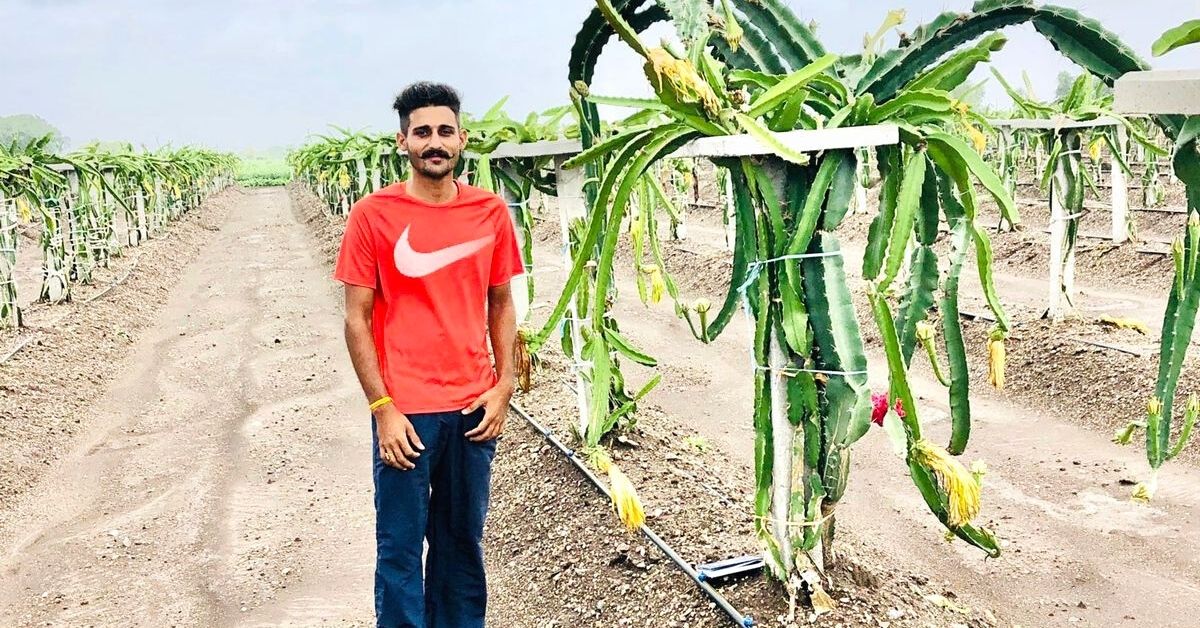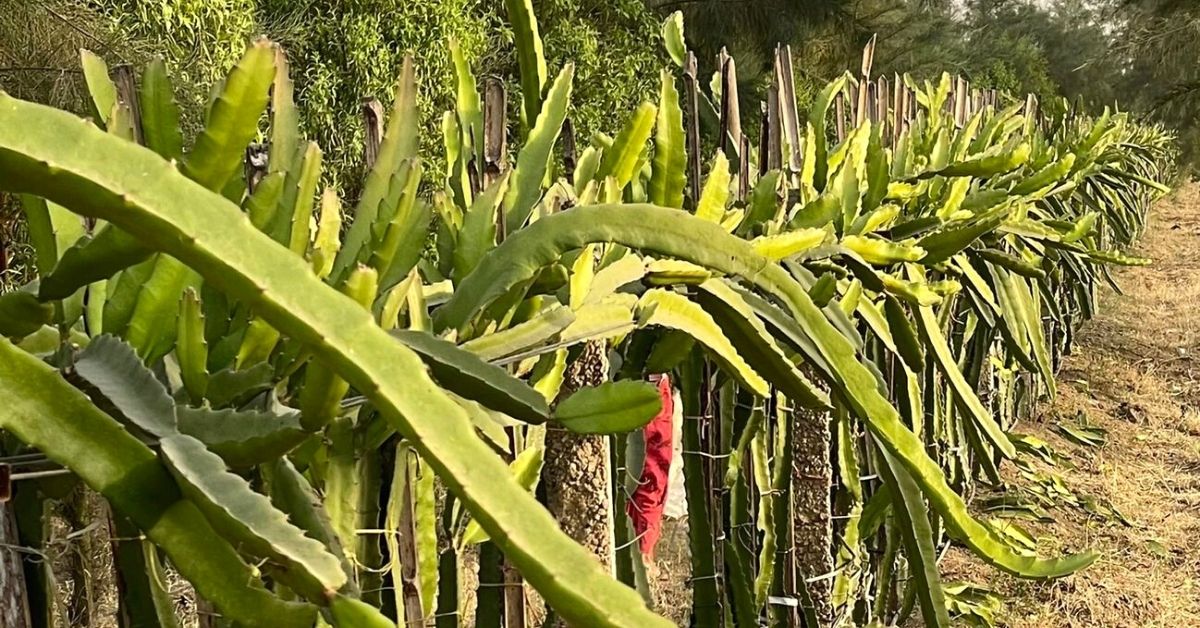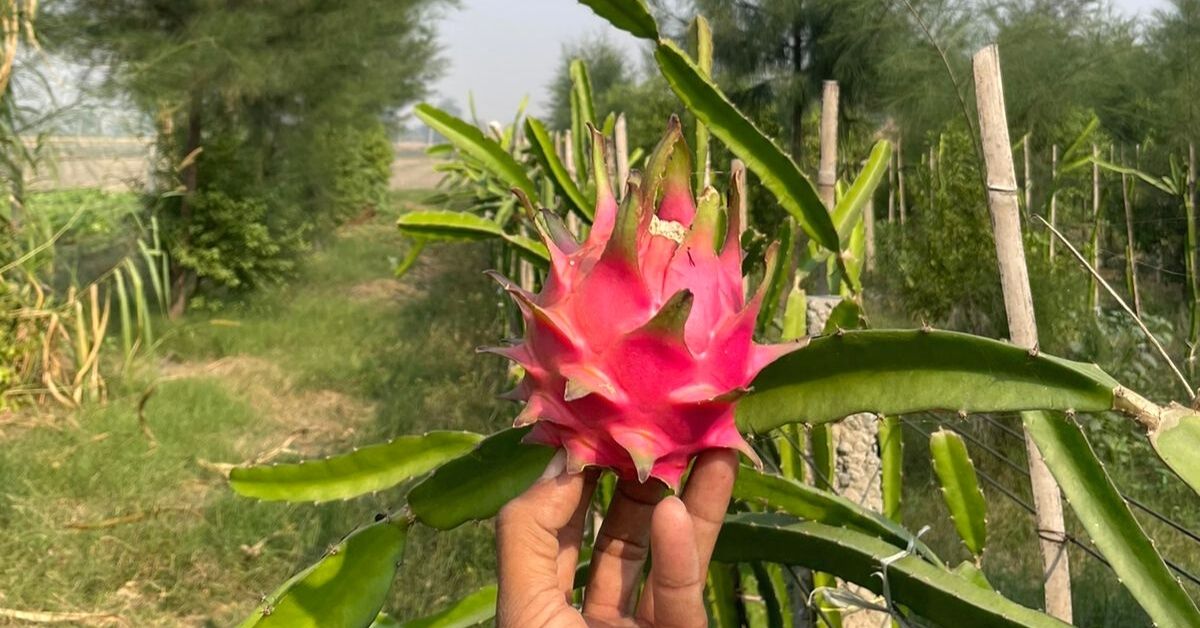Went Four Years With No Harvest, Now I Earn Rs 4 Lakh/Acre By Growing Dragon Fruit
Punjab farmer Amandeep Sarao first chanced upon dragon fruit during a trip with his friends. Today, he’s growing it organically, and earning lakhs from it

Sometimes, losing your way while travelling leads to uncharted paths, which in turn help us find life’s best adventures. For Punjab-based Amandeep Singh Sarao, losing his way while on a trip with his friends brought him straight to organic farming.
“I completed my graduation in arts in 2017, and decided to go on a road trip with friends to Gujarat,” he recalls in conversation with The Better India. “My friend, who was driving, took a wrong turn at some point, which led us to the outskirts of the state. While trying to find our way back to the original location, we passed through a series of plantations that looked like cacti.”
Curious, Amandeep and his friends decided to step out of the car. “We walked around the plantations and realised the plants had a unique fruit hanging on them,” the 23-year-old says. “I’d never seen it, even back home on our farm in Punjab.”

When he asked farmers what this was, he was told that these were all dragon fruit plants. “The plantations were owned by a farmer named Nikunj Pansuriya, who told us that it was a non-native, exotic fruit with great demand in the market, which helped him earn better profits. Later, I visited four neighbouring farms to seek more information. I decided to experiment with the fruit variety back on our farm in Punjab,” he says.
Earning lakhs per acre
Amandeep learned more about dragon fruit farming on social media and YouTube, and realised that it was a growing trend in India. “It is a lucrative proposition, as dragon fruit fetches a price of Rs 200-225 per kilo. I visited some farmers across Maharashtra and Hyderabad who were growing it. I also found one farmer from Barnala, Harbant Singh Aulakh, who was also growing in my state,” he adds.
Amandeep then sourced the plants from these states and carved out a two-acre land on his farm in Mansa village for cultivation. But he failed miserably.
“I failed to grow crops for four consecutive years. The saplings could not adapt to the weather conditions, and it took time to understand the requirements of the plants. I learned that the soil on my farm was much more fertile and did not require the use of chemical fertilisers and pesticides. The excess use of fertilisers was affecting the plants’ growth. Moreover, they could not acclimatise to the extreme weather temperatures,” he says.
Amandeep then altered his approach and opted for an organic farming method. “I took guidance from Harbant and other farmers from Gujarat, who had become friends by then. I used jeevamrut to improve soil fertility, and used neem as well as other organic substances. Their advice and my efforts started showing results, and eighteen months later, the plants started bearing fruits.”

Today, his plantations include 12 varieties of dragon fruit, such as Valdivia Rosa, Asunta, American Beauty, Purple Haze, and others, and the harvest earns him around Rs 4 lakh per acre. “I have started harvesting, and the plants are still in their growing stages. I expect an increase in fruit production in the coming seasons, which will increase the profits,” he adds.
Amandeep says that his ‘never give up’ spirit helped him find success even after repeated failure for four years. “My family supported and motivated me at all times. I want every farmer in Punjab to move out of conventional farming of wheat and rice, and opt for alternate fruits to multiply their income,” he adds.
He says he has also taught over 100 farmers around his region and state about cultivating dragon fruit farms. “I hope the trend increases and benefits more farmers like me,” he says.
Edited by Divya Sethu
If you found our stories insightful, informative, or even just enjoyable, we invite you to consider making a voluntary payment to support the work we do at The Better India. Your contribution helps us continue producing quality content that educates, inspires, and drives positive change.
Choose one of the payment options below for your contribution-
By paying for the stories you value, you directly contribute to sustaining our efforts focused on making a difference in the world. Together, let’s ensure that impactful stories continue to be told and shared, enriching lives and communities alike.
Thank you for your support. Here are some frequently asked questions you might find helpful to know why you are contributing?


This story made me
- 97
- 121
- 89
- 167











